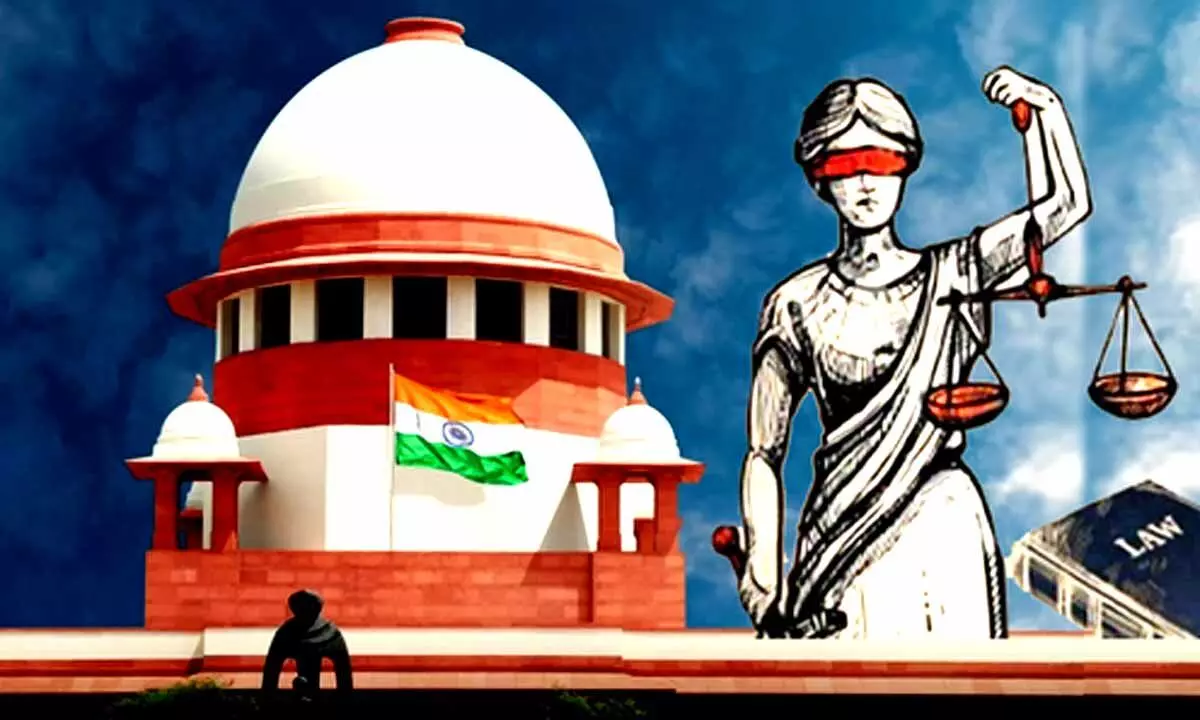Live
- Imran’s supporters seize Islamabad
- ‘Modi, RSS wall’ blocking path of SCs, STs, OBCs
- Supreme Court judge Viswanathan shares awful flight experience
- All you need to know about PAN 2.0
- Akasa Air redefines travel experience with industry-first offerings
- MP: Residents stage protests against liquor shop in Indore
- Telugu Actor Shri Tej Booked for Alleged Cheating and False Promise of Marriage in Live-in Relationship
- Toyota Kirloskar Motor Celebrates 1 Lakh Urban Cruiser Hyryder on Indian Road
- MLS: New York City FC part ways with head coach Nick Cushing
- Delhi CM says Centre cutting AAP voters’ names from rolls, BJP hits back
Just In
Judge cannot act like a robot in the process of dispensation of justice: Supreme Court

Supreme Court of India
The Supreme Court has said that a judge cannot shut his own eyes and act like a robot in the process of dispensation of justice.
New Delhi: The Supreme Court has said that a judge cannot shut his own eyes and act like a robot in the process of dispensation of justice.
A bench of Justices B.R. Gavai, J.B. Pardiwala and Prashant Kumar Mishra made the above observation in a recent judgement setting aside a death penalty awarded to a man by the Patna High Court in a 2015 case of murder and gang rape of a 10-year-old girl.
After hearing the appeal on merits, the bench remitted the matter back to the High Court for afresh consideration after noting that there were "serious lapses" in the investigation and on the part of defence.
In April 2018, the Patna High Court confirmed the judgment of conviction and sentence of death passed by a trial court in Bhagalpur for the offence punishable under Sections 302 (murder) and 376 (rape) of IPC and Section 4 of the Protection of Children from Sexual Offences Act, 2012.
In its judgment, the top court said that the oral evidence of the investigating officer "disturbed" it a lot, as she, in her cross examination before the trial court, admitted that following the instructions of her senior officers, she did not take any steps to procure the Forensic Science Laboratory (FSL) report.
"Who are these senior officers … and why they instructed (her) … not to procure the FSL report should have been a subject matter of inquiry by both, the State as well as the trial court," it said, adding that such lapse is just a tip of the iceberg and is a very serious flaw on the part of the investigating officer in a serious matter.
The Supreme Court said that it was the duty of the defence counsel to confront the witnesses with their police statements so as to prove the contradictions in the form of material omissions and bring them on record.
"We are sorry to say that the learned defence counsel had no idea how to contradict a witness with his or her police statements in accordance with Section 145 of the Evidence Act, 1872," it said.
It said that the lapse on the part of the public prosecutor is also something very unfortunate and he knew that the witnesses were deposing something contrary to what they had stated before the police.
"It was his (public prosecutor’s) duty to bring to the notice of the witnesses and confront them with the same even without declaring them as hostile," the apex court observed.
"The presiding officer of the trial court also remained a mute spectator. It was the duty of the presiding officer to put relevant questions to witnesses in exercise of his powers," said the Supreme Court, adding: "If the High Court would have taken little pains to look into the record, then immediately it could have taken recourse to Section 367 of the CrPC."
The top court said that free and fair trial is sine qua non of Article 21 of the Constitution of India, adding that If the criminal trial is not free and fair, then the confidence of the public in the judicial fairness of a judge and the justice delivery system would be shaken.
"No doubt he (judge) has to remain very vigilant, cautious, fair and impartial....This, however, would not mean that the judge will simply shut his own eyes and be a mute spectator, acting like a robot or a recording machine to just deliver what stands fed by the parties," it said.
"Justice has nothing to do with what goes on in the courtroom; Justice is what comes out of a courtroom," said the top court citing Clarence Darrow, a famous American lawyer.
It noted that the appellant has been in jail for more than nine years and said that the High Court will take up the death reference afresh for hearing expeditiously.
"(The appellant convict) may not be in a position to engage a lawyer of his choice. Probably, he may not be in a position to even understand what is said in this judgment. In such circumstances, the High Court may request a seasoned criminal side lawyer to appear on behalf of the appellant and assist the court," the Supreme Court said.

© 2024 Hyderabad Media House Limited/The Hans India. All rights reserved. Powered by hocalwire.com






